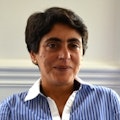Examining brain activity during motor learning in children with Developmental Coordination Disorder
Mae'r cynnwys hwn ar gael yn Saesneg yn unig.

Developmental Coordination Disorder (DCD) is a common motor disorder that negatively impacts on activities of daily living and affects approximately 5-6% of the childhood population.
Children with DCD often find performing and learning motor tasks difficult, although little is known about why this might be. One possibility is that an area of the brain, the mirror neuron system, may operate differently in children with DCD. The mirror neuron system activates when an individual performs an action, imitates an action or observes someone else performing an action.
While there is some evidence that the mirror neuron system may contribute to the motor impairments in DCD, no one has investigated whether differences in mirror neuron activity in children with DCD are specific to action observation, action production, or whether both processes are affected.
The CoMB study aims to recruit children with and without a diagnosis of DCD to examine mirror neuron activity while children observe actions and perform actions.
The findings from this study will provide insights for professionals, such as Occupational Therapists, working with children with DCD that could inform future interventions.
Funding
This project is funded by Waterloo Foundation.
Lead researcher

Dr Catherine Purcell
Darllennydd: Therapi Galwedigaethol
- purcellc2@caerdydd.ac.uk
- +44 (0)29 225 10961
